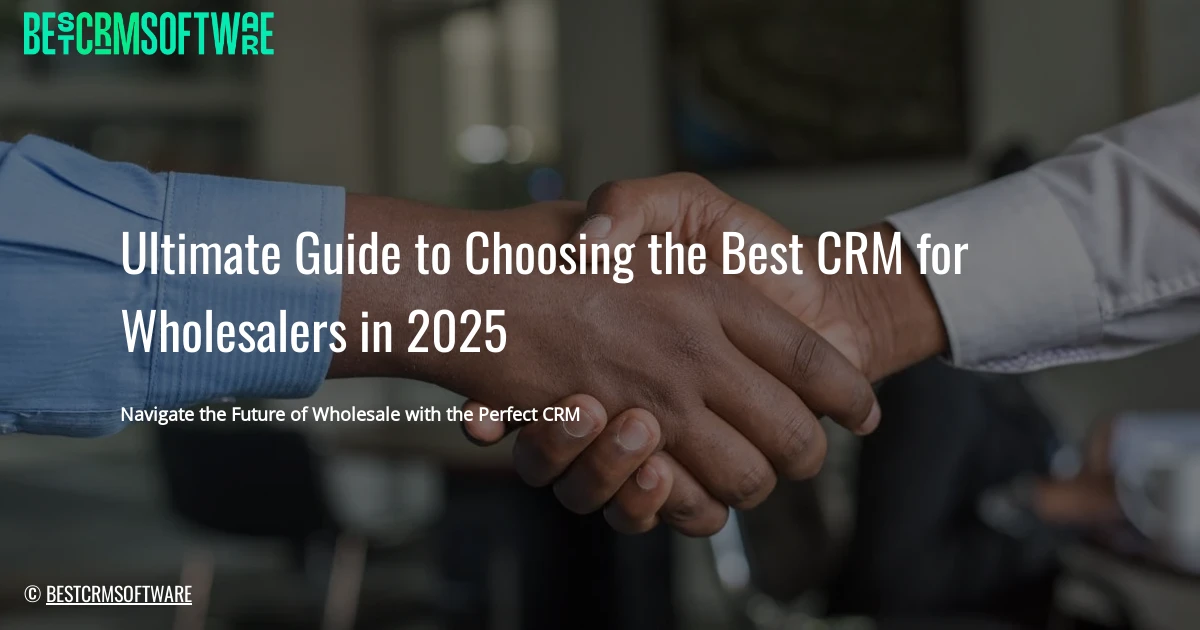Navigate the Future of Wholesale with the Perfect CRM
Introduction: Understanding Wholesale CRM & Its Importance
In the dynamic landscape of wholesale, staying ahead of the competition hinges on a robust and efficient system for managing customer relationships. Enter the Wholesale CRM, a crucial tool that empowers wholesalers to streamline their operations, foster deeper customer connections, and ultimately drive revenue growth.
But what exactly is a Wholesale CRM? Think of it as a central hub where all your crucial wholesale data is stored, organized, and analyzed. This includes customer details, order histories, purchase patterns, sales pipelines, marketing campaigns, and more. By unifying these insights, a Wholesale CRM provides valuable visibility into your business and enables you to:
- Enhance Customer Engagement: Develop personalized communication strategies, tailor your offerings to individual needs, and provide exceptional customer service that fosters loyalty.
- Boost Sales Efficiency: Streamline sales processes, track opportunities effectively, and prioritize high-potential leads, leading to accelerated sales growth.
- Optimize Inventory Management: Gain real-time insights into inventory levels, track order fulfillment, and prevent stockouts or overstocking.
- Improve Data-Driven Decision Making: Analyze customer data to identify trends, pinpoint areas for improvement, and make informed business decisions that drive profitability.
- Increase Operational Productivity: Automate repetitive tasks, streamline workflows, and reduce manual errors, freeing up valuable time for strategic initiatives.
In the ever-evolving wholesale landscape of 2025, where customer expectations are constantly shifting and competition is fierce, adopting a robust Wholesale CRM becomes more than just an option—it becomes a necessity. This guide will serve as your roadmap, exploring the essential features, functionalities, and considerations to help you choose the best Wholesale CRM for your business’ unique needs.
Essential CRM Features for Wholesalers: Streamlining Your Operations in 2025
As a wholesaler in 2025, staying competitive requires a CRM system that goes beyond basic contact management. You need a solution that can seamlessly integrate with your diverse workflows, streamline processes, and help you drive revenue growth. Here are the crucial features your CRM should possess:
1. Inventory Management:
- Real-Time Inventory Tracking: Gain a comprehensive view of your stock across all locations, with automatic updates on quantities, variations, and reorder points.
- Automated Stock Alerts: Be notified immediately when inventory levels fall below critical thresholds, ensuring timely restocking and avoiding lost sales.
- Advanced Inventory Forecasting: Use historical data and demand patterns to predict future stock requirements and prevent overstocking or stock-outs.
- Multi-Channel Integration: Manage inventory levels across your physical store, website, and marketplace platforms from a single interface.
2. Order Processing & Fulfillment:
- Order Automation: Simplify the ordering process by automating order confirmations, picking, packing, and shipping notifications.
- Multi-Channel Order Fulfillment: Handle orders seamlessly regardless of origin – web store, phone calls, email, or marketplace platforms.
- Real-time Order Tracking: Provide customers with accurate updates on their order status throughout the fulfillment process.
- Order Management Features: Integrate order processing with your shipping carriers for efficient delivery, manage returns and exchanges with ease, and generate custom invoices and packing slips.
3. Sales Force Automation:
- Sales Pipeline Management: Track sales opportunities from lead generation to closure, with detailed information on customer interactions and progress.
- Automated Sales Outreach: Personalize communication with targeted marketing campaigns, personalized emails, and automated follow-up reminders.
- Sales Forecasting: Analyze past sales data to project future revenue and identify areas for growth or potential roadblocks.
- Performance Reporting: Gain insights into individual sales team members’ activities and performance metrics to identify strengths and areas for improvement.
4. Customer Relationship Management:
- Centralized Customer Database: Create comprehensive customer profiles, capturing valuable information on purchase history, demographics, and communication preferences.
- Personalized Communication: Send targeted marketing campaigns, newsletters, and product recommendations based on individual customer needs and preferences.
- Customer Service Integration: Provide prompt and efficient support through dedicated ticketing systems, live chat, or phone integrations.
- Customer Feedback and Review Management: Encourage customer engagement with feedback forms and automated surveys. Use this data to improve product offerings and service quality.
5. Marketing Automation:
- Email Marketing Integration: Design and automate personalized email marketing campaigns to engage with your target audience.
- Social Media Management: Schedule and track your social media campaigns directly from your CRM system, maximizing your online presence.
- Lead Generation and Qualification: Use forms, landing pages, and targeted ads to capture new leads and automatically qualify them for relevant product offerings.
- Automated Reporting: Monitor campaign performance metrics and identify areas for improvement.
Remember: The ideal CRM solution for your wholesale business will vary based on your unique needs, budget, and business size. Choosing a system with the features highlighted above will give you a solid foundation for enhancing your sales process, building customer relationships, and driving your business to success in 2025 and beyond.

© fauxels
Deployment Models: Choosing the Right Fit
As a wholesaler, understanding the deployment model of your CRM is crucial for making an informed decision. You’ll primarily be faced with two main options: cloud-based and on-premise. Let’s explore their advantages and disadvantages to help you choose the best fit for your needs:
Cloud-Based CRM:
- Advantages:
- Accessibility: Access data and functionality from any device with internet connectivity, enabling anytime, anywhere access.
- Scalability: Easily scale your CRM up or down as your business grows, adding or removing users as needed without significant upfront investment.
- Cost-Effectiveness: No need for expensive hardware or software installations. Typically, cloud-based CRMs are offered as a subscription-based service with predictable monthly fees.
- Automatic Updates: Updates and maintenance are handled by the cloud provider, ensuring you always have the latest features and security patches.
- Collaboration: Improved collaboration across departments and with external stakeholders with easy sharing and real-time data updates.
- Disadvantages:
- Internet Dependency: Reliance on internet connectivity, potentially leading to downtime during outages.
- Data Security: Concerns around data security and potential vulnerabilities in cloud infrastructure (although reputable providers have robust security measures).
- Customization: Might be less flexible in terms of customization compared to on-premise options, requiring more reliance on the vendor’s functionalities.
On-Premise CRM:
- Advantages:
- Complete Control: You own and manage the hardware and software, giving you complete control over data and customizations.
- Data Security: Improved control over data security as you manage all aspects of the infrastructure and security protocols.
- Customization: High level of customization options to tailor the system specifically to your business processes and needs.
- Disadvantages:
- Initial Investment: Requires significant upfront investment in hardware, software, and IT support, making it a costly option.
- Maintenance and Updates: Responsibility for maintaining the infrastructure, software updates, and security patches falls entirely on your team.
- Scalability: Can be more difficult and expensive to scale up as your business grows, requiring significant upgrades in hardware and software.
Choosing the Right Fit:
Ultimately, the ideal deployment model depends on your individual business needs, budget, and technical expertise. Here are some factors to consider:
- Business Size: Small to mid-sized businesses often find cloud-based solutions more affordable and manageable. Larger businesses with complex requirements might benefit from the control and customization offered by on-premise CRMs.
- IT Resources: Do you have the internal resources to manage and maintain an on-premise CRM, or do you prefer a more hands-off cloud-based approach?
- Security Needs: Determine your data security needs and evaluate the strengths and weaknesses of each option.
- Customization Requirements: If you require a highly customized system to fit your unique business processes, an on-premise option might be more suitable.
- Budget: Evaluate the total cost of ownership, including upfront investment, ongoing maintenance, and support for both cloud-based and on-premise solutions.
By carefully evaluating your options and prioritizing your needs, you can confidently choose the right CRM deployment model for your wholesale business and unlock its full potential.
Key Considerations for CRM Selection
Choosing the right CRM for your wholesale business can significantly impact your efficiency and profitability. To make the best decision, it’s crucial to carefully evaluate the following factors:
1. Industry-Specific Features
A good CRM caters to your specific needs. For wholesalers, look for features that:
- Manage Distributor Relationships: Robust functionalities for managing distributors, including order tracking, inventory visibility, and communication tools.
- Sales Forecasting & Reporting: Powerful analytics to predict future sales, identify sales trends, and gain insights into your distributors’ performance.
- Inventory Management: Tools to track stock levels, monitor demand, and automate replenishment processes, minimizing stockouts and maximizing efficiency.
- Pricing & Discounts: Features to manage complex pricing structures, set discounts for different distributors, and track profitability for individual product lines.
- Compliance & Regulations: Integration with compliance requirements specific to your industry, including traceability and data management features.
2. Scalability and Integrations
As your business grows, so should your CRM solution. Consider:
- Growth Potential: Ensure the platform can handle increasing data volumes and users. Look for solutions that offer flexible pricing plans or tiered solutions for various business sizes.
- API Integration: The CRM should seamlessly integrate with your existing systems like accounting software, email marketing platforms, and e-commerce tools for smoother data flow and workflows.
- Customization Options: Ability to customize reports, workflows, and dashboards to match your unique needs and processes.
- Scalable Support: Access to technical support that can assist with growing pains and help you implement the CRM effectively as your business evolves.
3. Pricing and Budget Considerations
Price is a significant factor, but it’s essential to avoid sacrificing functionality for a cheaper option:
- Cost per user: Determine if the CRM offers flexible plans, paying only for features and users you require.
- Implementation costs: Factor in installation fees, training, and ongoing maintenance costs into your overall budget.
- Value for money: Assess the long-term return on investment and how the CRM will enhance productivity and streamline processes to justify the cost.
- Free Trials & Demo Versions: Utilize trial periods and demo versions to get a practical experience and compare functionalities before committing.
4. User Experience and Training
User adoption and ease of use are key to maximizing your CRM investment:
- Intuitive Interface: The platform should be user-friendly and easy to navigate for your team, including users without technical expertise.
- Mobile Accessibility: Offer functionality through a mobile app for anytime, anywhere access to critical information.
- Training and Support: Look for a CRM that offers comprehensive onboarding, ongoing training materials, and responsive customer support for assistance with technical issues and usage.
By considering these key considerations and prioritizing solutions tailored to your specific needs and budget, you can find the ideal CRM to power your wholesale business in 2025 and beyond.

© Pixabay
Best CRM Software for Wholesalers (with Comparison)
Finding the right CRM is crucial for wholesalers to streamline operations, enhance customer relationships, and drive growth. But with so many options available, it can be challenging to identify the perfect fit. This section dives into the top CRM solutions specifically designed for wholesalers, offering an in-depth comparison of features, pricing plans, and suitability for different needs.
Top CRM Solutions Tailored for Wholesalers:
- Zoho CRM: Renowned for its extensive suite of features, Zoho CRM is a versatile option with robust sales and marketing tools, customizable workflows, and powerful analytics. Its intuitive interface caters to various industries, making it a solid choice for wholesalers.
- Microsoft Dynamics 365: A comprehensive platform with advanced functionality, Microsoft Dynamics 365 excels at managing complex operations and integrating with existing systems. Its robust reporting tools and financial management capabilities are particularly advantageous for wholesalers dealing with large transactions.
- Salesforce: A market leader in the CRM space, Salesforce boasts a rich ecosystem with tailored solutions for different industry verticals. Salesforce offers flexible scalability, automation, and robust data management tools, catering to wholesalers with growing needs.
- Sage Intacct: A cloud-based accounting and ERP solution, Sage Intacct combines robust financial management features with CRM capabilities. This comprehensive platform is ideal for wholesalers requiring integrated financial tracking and inventory control.
- NetSuite: A cloud-based ERP system specifically designed for growing businesses, NetSuite delivers comprehensive functionalities spanning CRM, finance, inventory, and e-commerce. Its built-in workflows and robust reporting tools can streamline operations and enhance customer engagement.
In-depth Comparison of Features:
| CRM Software | Sales Management | Customer Management | Inventory & Order Management | Marketing Automation | Analytics & Reporting |
|---|---|---|---|---|---|
| Zoho CRM | Sales pipelines, opportunity tracking, forecasting | Detailed contact information, segmentation, customer journey tracking | Basic inventory tracking, order management | Email marketing, social media integration | Customized dashboards, reporting tools |
| Microsoft Dynamics 365 | Advanced sales automation, pipeline management, sales forecasting | Account management, relationship building tools | Inventory tracking, order processing, real-time inventory visibility | Automated email campaigns, marketing automation workflows | Advanced reporting, predictive analytics, dashboards |
| Salesforce | Sales automation, pipeline management, lead qualification | Account management, relationship building, customer support tools | Integration with inventory management systems, order tracking | Automated email campaigns, marketing automation, personalized experiences | Customizable dashboards, powerful reporting tools, advanced analytics |
| Sage Intacct | Integration with CRM features, sales management tools | Contact management, opportunity tracking | Integrated inventory management, order processing, real-time inventory visibility | Limited marketing automation capabilities | Advanced financial reporting, customized dashboards, key performance indicators (KPIs) |
| NetSuite | Integrated sales management, pipeline tracking, opportunity forecasting | Account management, customer relationship tools | Inventory management, order fulfillment, automated stock management | Marketing automation, email campaigns, online marketing tools | Comprehensive reporting, dashboards, customizable KPI tracking |
Pricing Plans & Suitability:
Each CRM solution offers various pricing tiers based on features, user numbers, and storage requirements.
- Zoho CRM: Offers a range of plans with varying pricing, from the free basic version to Enterprise packages with advanced features.
- Microsoft Dynamics 365: Provides different versions based on functionalities, with pricing determined by subscription and user count.
- Salesforce: Offers multiple pricing plans, with the complexity and cost increasing with advanced functionalities and integrations.
- Sage Intacct: Pricing depends on features, user count, and storage needs, with dedicated plans tailored to specific industries, including wholesale.
- NetSuite: Delivers subscription-based pricing, with customizable plans accommodating businesses of different sizes and needs.
Ultimately, choosing the best CRM for your wholesale business requires careful consideration of your budget, business size, desired features, and integration requirements. The detailed comparison presented here provides valuable insights into leading CRM solutions, allowing you to make informed decisions and select the platform that best fits your specific needs.
Choosing the Right CRM Based on Business Size
The best CRM for your wholesale business depends heavily on the size and scale of your operation. Here’s a breakdown of considerations for each category:
1. CRM for Small Wholesalers:
- Key Priorities: Affordability, ease of use, basic features.
- Features:
- Contact Management: Track customer and prospect information, including contact details, purchase history, and communication logs.
- Basic Sales Pipeline: Visualize the sales process and manage leads effectively.
- Order Tracking: Keep a handle on orders from point of sale to delivery.
- Email Marketing: Basic email automation and marketing campaigns to nurture leads and build relationships.
- Recommended Options: Zoho CRM, HubSpot CRM (free version), Monday.com, Pipedrive, Freshsales.
2. CRM for Medium-Sized Businesses:
- Key Priorities: Scalability, advanced automation, integration with other business tools.
- Features:
- Enhanced Contact Management: More comprehensive data analysis and segmentation capabilities.
- Sales Automation: Automated tasks for sales workflows like lead qualification and opportunity management.
- Reporting and Analytics: In-depth insights into sales performance, customer behavior, and campaign effectiveness.
- Integration Capabilities: Seamlessly integrate with e-commerce platforms, accounting software, and other business systems.
- Recommended Options: Salesforce Essentials, Microsoft Dynamics 365, Sage CRM, Zoho CRM Professional, SAP CRM.
3. CRM for Large Enterprises:
- Key Priorities: Complex integration capabilities, extensive reporting and data analysis, customizable workflows.
- Features:
- Customizable Solutions: Highly adaptable to specific business needs and processes.
- Advanced Sales Analytics: Deep dives into customer data to gain insights for optimization.
- Marketing Automation: Robust automation for complex campaigns, multi-channel marketing, and data-driven personalization.
- Multi-Channel Support: Handle interactions across multiple channels like phone, email, social media, and chat.
- Recommended Options: Salesforce Enterprise, Microsoft Dynamics 365, SAP CRM, Oracle Siebel, Infor CRM.
Important Note: It’s essential to consider your business’s specific needs, budget, and long-term growth plans when selecting a CRM. Evaluate the features, functionalities, and pricing of different options before making a final decision. Consulting with a CRM expert or solution provider can also help you find the perfect match.

© Savvas Stavrinos
Leading CRM Giants: Pros and Cons for Wholesalers
Choosing the right CRM is crucial for wholesale businesses to streamline operations, manage relationships, and boost sales. While numerous options exist, several established CRM giants stand out for their comprehensive features and scalability. Here’s a breakdown of their pros and cons tailored specifically for wholesalers:
1. Salesforce
Pros:
- Industry-leading platform: Known for its extensive functionality and vast ecosystem of apps, Salesforce offers tailored solutions for wholesale distribution.
- Robust Sales Automation: Features like opportunity management, lead scoring, and forecasting tools empower sales teams to close deals faster and increase conversion rates.
- Strong Customer Support: Offers comprehensive training materials, resources, and a dedicated customer support team to ensure a smooth onboarding and usage experience.
- Scalability: Handles growing businesses seamlessly, expanding as needed to accommodate increased data and users.
- Integrations: Connects with various third-party applications for seamless data sharing across departments.
Cons:
- Expensive: Salesforce can be costly, especially for small or medium-sized wholesale businesses, with a high initial investment and ongoing subscription fees.
- Complexity: Its intricate setup and feature-rich platform can overwhelm new users, requiring dedicated training and time to learn the system.
- Customization: Achieving optimal customization to fit specific business processes might necessitate hiring Salesforce consultants, adding further expenses.
2. SAP CRM
Pros:
- Industry Focus: Deeply integrated with SAP ERP systems, SAP CRM excels in managing complex supply chains and handling high volumes of data prevalent in wholesale.
- Extensive Data Analytics: Provides in-depth analytics dashboards to analyze customer behavior, track sales performance, and uncover trends for optimized decision-making.
- Real-time Inventory Management: Offers robust inventory control features for efficient stock management and proactive reordering to prevent stockouts.
- International Presence: A globally recognized brand with strong support and resources in diverse regions, suitable for wholesalers with international operations.
Cons:
- Technical Expertise: Requires strong IT knowledge and skilled technical personnel to implement and maintain effectively, potentially increasing setup and ongoing costs.
- Complexity: Designed for large enterprise operations, SAP CRM might be overkill for smaller businesses, potentially adding unnecessary features and complexities.
- Limited Customization: May require custom development to fully integrate with specific business processes, incurring extra cost and potential delays.
3. Microsoft Dynamics 365
Pros:
- User-Friendly Interface: Known for its intuitive design and ease of use, making it accessible for various roles and levels of technical expertise.
- Competitive Pricing: Offers tiered pricing models with options that are cost-effective for both small and medium-sized wholesale businesses.
- Strong Integration Capabilities: Integrates seamlessly with Microsoft Office 365 applications and other tools for streamlined workflow and data sharing.
- Focus on Customer Engagement: Includes built-in marketing and customer service functionalities for enhanced customer interactions and improved retention.
Cons:
- Limited Functionality: While versatile, Dynamics 365 might not possess the depth of features found in other CRM giants like Salesforce, potentially requiring additional tools for specific functionalities.
- Scalability Concerns: While capable of handling growth, Dynamics 365’s scalability can become limited as businesses expand significantly.
- Less Established: Compared to older players like Salesforce and SAP, Dynamics 365 is a relatively newer player with a smaller ecosystem of available apps.
4. Oracle CRM
Pros:
- Powerful Analytical Capabilities: Offers advanced data analytics and reporting tools for insightful customer segmentation and effective targeting of wholesale clients.
- Excellent Customer Service Features: Integrates well with customer service solutions, facilitating quick and efficient responses to inquiries and handling customer issues proactively.
- Strong Industry Verticals: Caters to specific industries, including wholesale, with pre-configured solutions to address unique business requirements.
- Global Reach: Like SAP, Oracle has a global presence with support available across diverse markets, ideal for wholesalers with international operations.
Cons:
- Expensive: Similar to Salesforce, Oracle CRM can be expensive for smaller businesses, especially considering its licensing costs and implementation requirements.
- Complex Configuration: Requires expert knowledge and technical skills for proper setup and customization, making it challenging for businesses without dedicated IT staff.
- Legacy Technology: Oracle’s technology might seem dated compared to more modern solutions, leading to usability issues and potentially impacting user adoption.
Ultimately, the ideal CRM for a wholesaler will depend on various factors, including budget, company size, specific business needs, and available resources. Carefully analyzing these pros and cons can help wholesalers choose the solution that best fits their growth and success in 2025 and beyond.
Popular Cloud-based CRMs: Affordable & Effective Options
For wholesalers seeking a robust yet budget-friendly CRM solution, cloud-based options offer an attractive blend of affordability and functionality. Here are some of the most popular platforms catering specifically to the wholesale industry:
1. Zoho CRM: This comprehensive platform boasts an intuitive interface and a wide array of features, making it ideal for wholesalers who manage complex sales cycles. Zoho offers:
- Deep customization: Tailor your workflows to your specific needs and seamlessly integrate with various existing tools.
- Excellent reporting: Gain valuable insights into your sales performance with detailed dashboards and reports.
- Robust automation features: Save time by automating tasks like email campaigns and follow-up reminders.
- Competitive pricing plans: Choose from various packages tailored to different business sizes and needs.
2. HubSpot CRM: Known for its powerful marketing tools, HubSpot offers a free CRM option alongside its paid plans. This platform focuses on:
- Seamless lead management: Streamline your lead nurturing process with features like contact management and lead scoring.
- Targeted marketing campaigns: Craft personalized campaigns across different channels to reach the right customers.
- Powerful reporting and analytics: Track campaign performance and identify areas for improvement.
- Strong integrations: Seamlessly integrate with other HubSpot products like marketing automation and sales automation.
3. Pipedrive: A visually appealing CRM built with salespeople in mind, Pipedrive focuses on simplicity and efficiency:
- Pipeline visualization: Get a clear picture of your sales progress through a visually appealing pipeline view.
- Activity tracking: Stay on top of tasks and follow-up reminders to ensure timely sales execution.
- Automated sales processes: Automate repetitive tasks like data entry and follow-up emails for improved productivity.
- Affordable pricing: Pipedrive offers competitive plans with a transparent pricing model.
4. Freshworks CRM: This platform offers a user-friendly experience and a wide range of features tailored for growing businesses:
- Excellent customer service features: Equip your team with tools for managing tickets, live chat, and phone support.
- Built-in communication channels: Streamline communication with customers via email, phone, and social media.
- Focus on customization: Adapt Freshworks CRM to your specific workflows and business requirements.
- Scalable solutions: Growing businesses will appreciate Freshworks’ scalability to handle expanding sales operations.
5. Insightly: A powerful and customizable platform for managing customer relationships and streamlining sales processes, Insightly provides:
- Detailed customer profiling: Build comprehensive customer profiles to gain valuable insights for targeted marketing and sales.
- Project management integration: Seamlessly integrate your project management tools for efficient project tracking and communication.
- Open API: Utilize the platform’s open API to connect with other business applications for improved efficiency.
- Flexible pricing: Choose from a range of pricing plans based on your team size and feature requirements.
While each of these cloud-based CRMs offers compelling benefits, the best choice ultimately depends on your specific business needs and budget. Evaluate each platform carefully to find the perfect fit for your wholesale business.

© fauxels
CRM Integration Strategies for Wholesalers
Integrating your CRM with existing systems is crucial for streamlining workflows and creating a unified view of your customer data. This section outlines key aspects of CRM integration strategies tailored for wholesalers in 2025.
Points to Consider:
- Integrating CRM with Existing Systems:
- Inventory Management Systems: Seamlessly link your CRM with your inventory management system to avoid stock-outs and optimize order fulfillment. Real-time inventory updates allow sales reps to provide accurate lead times and avoid frustrating customers with stock shortages.
- ERP (Enterprise Resource Planning) Systems: A fully integrated ERP system enables comprehensive data flow between finance, logistics, and customer relationship management. Track orders, manage invoices, monitor payments, and gain insightful analytics to make data-driven decisions.
- e-Commerce Platforms: Integrating your CRM with your online store helps you automate order processing, track customer behavior, and leverage purchase history to personalize marketing efforts.
- Accounting Software: Synchronization with accounting software allows you to track customer payments, automate invoicing, and reconcile accounts effortlessly.
- Marketing Automation Tools: Combine your CRM with marketing automation platforms for automated email campaigns, lead nurturing, and personalized outreach, increasing marketing efficiency and effectiveness.
Benefits of CRM Integration:
- Improved efficiency: Automate data transfer, eliminating manual data entry and minimizing errors.
- Data-driven decisions: Access a centralized, holistic view of customer data across various systems, enabling accurate market analysis and informed decisions.
- Enhanced customer experience: Provide real-time information about order status, availability, and payment details for a smooth and efficient customer experience.
- Streamlined processes: Connect disparate systems for seamless communication, optimizing workflow, and improving overall productivity.
Tips for successful integration:
- Choose a CRM with strong API connectivity: Ensure your chosen CRM seamlessly integrates with your existing systems.
- Plan your integration process: Carefully map out the data flow and integration points, prioritizing crucial processes.
- Prioritize data security: Ensure secure data transmission and storage while integrating different systems.
- Engage professional help if needed: Consult with a CRM specialist or systems integrator to navigate complex integrations.
By effectively integrating your CRM with existing systems, wholesalers in 2025 can enhance customer relationships, improve operational efficiency, and ultimately gain a competitive edge in the evolving business landscape.
Leveraging CRM for Seamless Operations
In the fast-paced world of wholesaling, efficiency is paramount. Choosing the right CRM is about more than just managing contacts – it’s about building a system that streamlines operations and fosters growth. This section explores two crucial aspects of how CRMs can enhance your wholesale business:
1. Connecting CRM with Inventory Management:
Integrating your CRM with your inventory management system is a game-changer for wholesalers. By bridging this gap, you can:
- Gain real-time inventory visibility: Access accurate, up-to-the-minute stock information within your CRM, allowing sales reps to quickly answer customer inquiries about product availability.
- Automate order fulfillment: Directly link sales orders in your CRM to your inventory system, simplifying order processing and minimizing the risk of overselling or delays.
- Reduce manual data entry: Eliminating the need to manually transfer data between systems streamlines your workflows and saves valuable time.
- Enhance forecasting accuracy: Analyze sales data and inventory trends seamlessly to optimize your inventory planning and improve forecasting accuracy.
2. Streamlining Sales & Ordering Process:
A robust CRM can revolutionize how you handle sales and orders:
- Simplified order management: Easily track all order stages from inquiry to fulfillment, allowing you to monitor progress and quickly address any issues.
- Automated quote generation: Create and send professional, customized quotes instantly, streamlining the quoting process and eliminating errors.
- Personalized customer experiences: Track customer interactions, preferences, and purchase history to offer personalized recommendations and tailor your communications for greater satisfaction.
- Increased order accuracy: Use features like pre-defined product catalogs and order templates to ensure accurate order entry and reduce mistakes.
- Centralized communication hub: Access all communication channels within your CRM (phone, email, chat, etc.) providing a single point of truth for your sales team.
By connecting your CRM with your inventory system and streamlining your sales and order processes, you empower your team to work smarter, not harder. You achieve greater efficiency, improve customer satisfaction, and drive revenue growth – crucial factors in the competitive wholesale landscape.

© Lukas
CRM for Enhanced Customer Relationships:
Understanding Customer Segmentation in Wholesale
In the fast-paced world of wholesale, understanding your customer segments is paramount. A CRM isn’t just a contact list; it’s a powerful tool for categorizing your buyers based on shared characteristics and allowing you to tailor your approach to each group. Here’s how CRM empowers effective customer segmentation:
- Identify Key Attributes: CRM helps you identify relevant factors that define your segments. This could include:
- Order size & frequency: Distinguishing between high-volume, high-frequency customers and those making occasional, smaller orders.
- Industry: Focusing on specific industries helps you offer relevant products and promotions.
- Product interest: Tracking what your buyers are purchasing lets you tailor targeted marketing campaigns.
- Geographic location: Understanding regional preferences helps refine your marketing and inventory management.
- Optimize Marketing & Sales Efforts: By segmenting your customer base, you can:
- Target the right messages to the right people: Ensure your marketing campaigns resonate with each segment’s needs and interests.
- Allocate sales resources effectively: Focus your sales efforts on segments with the highest potential for growth.
- Develop targeted offers: Design promotions specifically tailored to the needs and preferences of each customer group.
Personalized Communication Strategies
Once you’ve segmented your customers, a CRM allows you to build a strong foundation for personalized communication. It helps you:
- Track Customer Interaction: Document every communication and transaction to gain a deep understanding of each customer’s journey.
- Deliver Personalized Recommendations: Analyze past purchase behavior and provide tailored recommendations based on their preferences.
- Automate Targeted Emails: Send relevant updates, promotions, and newsletters based on their purchasing patterns and interests.
- Manage Multi-Channel Communication: Use CRM to send SMS updates, integrate with chatbots, and personalize communication through social media, all in one place.
By combining powerful customer segmentation tools with personalized communication features, CRM platforms revolutionize the way wholesalers engage with their customers, leading to increased customer loyalty, improved sales conversion rates, and ultimately, greater profitability.
Utilizing CRM for Effective Marketing & Sales
A robust CRM is not just about managing customer data, it’s about leveraging that data to optimize your marketing and sales efforts. For wholesalers in 2025, this means:
1. Data-Driven Insights for Targeted Campaigns:
- Understand your buyer personas: Deep dive into customer data to understand who your ideal clients are – their needs, preferences, buying behaviors, and even the best times to reach them.
- Segment your customer base: Group customers by purchasing patterns, industry, size, and other relevant factors. This allows for personalized messaging and tailored offers that resonate with each segment.
- Analyze purchase history & trends: Uncover hidden insights about your products – what sells best, what’s experiencing declining demand, and what emerging opportunities exist. This data-driven knowledge can help you anticipate trends and adjust your marketing accordingly.
2. Marketing Automation for Efficient Outreach:
- Targeted email marketing: Create automated email sequences based on specific customer behaviors or events. This ensures timely follow-up and relevant communication. For instance, an email campaign could welcome new customers, recommend complementary products, or announce sales and promotions to existing customers.
- Personalized offers & promotions: Tailor offers to specific customer segments based on their needs and purchase history. This strategy can lead to higher engagement and increased conversions.
- Workflow automation: Streamline your processes, reducing manual tasks and allowing your sales team to focus on high-value activities. Examples include: lead scoring, automatic email responses to frequently asked questions, and lead nurturing programs.
- Social media integration: Manage your social media outreach from your CRM. Track campaign performance and see which platforms resonate best with your audience.
By combining data analysis with marketing automation, your CRM becomes a powerful engine for driving sales and maximizing your marketing return on investment (ROI). You gain valuable insights into your target audience, personalize your outreach, and free up your team to focus on high-value activities.

© fauxels
Boosting Sales Performance with CRM Data
In today’s competitive wholesale landscape, every edge counts. That’s where a CRM designed for wholesalers becomes a game-changer. Here’s how the right CRM can empower you to skyrocket your sales performance:
1. Real-time Sales Tracking & Forecasting:
Imagine a clear picture of your sales pipeline, not just today, but into the future. With a robust CRM, you can:
- Track all sales activities: Every call, email, meeting, and interaction with customers is meticulously documented, giving you a comprehensive understanding of the sales process.
- Generate detailed reports: Analyze sales trends, identify bottlenecks, and pinpoint opportunities for improvement.
- Forecast future revenue: By leveraging historical data and ongoing activity, CRM systems can offer accurate predictions about future sales performance, enabling informed business decisions.
- Stay ahead of the competition: Access real-time data to quickly adjust sales strategies and optimize campaigns based on current market trends.
2. Pipeline Management & Opportunity Optimization:
Don’t just react to opportunities, seize them proactively. Here’s how CRM streamlines pipeline management:
- Prioritize leads: Classify leads based on their potential value and focus resources on the most promising prospects.
- Assign leads to sales representatives: Efficiently distribute leads to the right sales team members based on expertise and location.
- Track progress: Monitor the progress of each opportunity through various stages of the sales cycle, ensuring a streamlined workflow.
- Automated reminders & tasks: Never miss a crucial touchpoint with customers. Schedule follow-ups and manage tasks to keep deals moving forward.
With these capabilities, CRM empowers you to effectively:
- Maximize conversion rates: Identify and nurture high-potential opportunities, resulting in higher closing rates.
- Shorten sales cycles: Streamline workflows, prioritize leads, and ensure timely communication to speed up deal closure.
- Focus on high-value clients: Allocate time and resources efficiently by targeting high-value prospects for maximum sales impact.
In the dynamic wholesale environment, having access to real-time insights and a streamlined pipeline management system is not a luxury, it’s a necessity for sustainable success. The right CRM can be your most valuable asset in navigating the competitive landscape and reaching peak sales performance.
Leveraging CRM Analytics for Business Intelligence: Analyzing Customer Buying Patterns & Trends
Choosing the right CRM for your wholesale business is a strategic investment. It’s not just about contact management and order tracking; it’s about understanding your customers and leveraging data to drive business growth.
One of the key advantages of using a CRM for wholesalers is the power of analytics. CRM software allows you to gather valuable insights into customer buying patterns and emerging trends, ultimately turning data into actionable intelligence. Here’s how you can leverage CRM analytics to gain a competitive edge:
1. Identifying Key Customer Segments:
- Customer Segmentation: CRM tools empower you to categorize customers based on demographics, buying history, purchase volume, order frequency, and other key factors. This allows you to tailor marketing and sales strategies to specific segments, increasing the effectiveness of your efforts.
- Identifying High-Value Customers: By analyzing customer data, you can identify your most profitable customers and prioritize your interactions with them. Rewarding their loyalty with exclusive deals or personalized services strengthens your relationships and maximizes revenue.
2. Uncovering Purchase Patterns & Trends:
- Historical Order Analysis: Examine historical order data to uncover seasonal buying trends, product popularity, and average order value. This data reveals valuable insights about your product catalog, allowing you to forecast demand, manage inventory, and strategically promote products.
- Product Cross-Selling and Upselling: Analyzing purchase patterns can highlight opportunities for cross-selling and upselling. For example, you might notice customers who buy product A often also purchase product B. Leveraging this information allows you to personalize product recommendations and increase average order value.
3. Optimizing Sales and Marketing Campaigns:
- Campaign Performance Tracking: CRM analytics enable you to track the success of your sales and marketing campaigns by monitoring conversion rates, click-through rates, and customer engagement levels. This allows you to refine your campaigns based on real-time data, ensuring they deliver the best results.
- Targeted Marketing: Utilizing the insights gleaned from customer data, you can craft highly targeted marketing campaigns. This reduces wasted ad spend and ensures that your message reaches the most relevant audience. Personalized emails, targeted ads, and exclusive offers are more likely to resonate with customers.
4. Monitoring Customer Sentiment:
- Feedback & Review Analysis: Modern CRM systems often include features for collecting and analyzing customer feedback and reviews. By monitoring these inputs, you can gauge customer satisfaction, identify areas for improvement, and address any potential concerns before they escalate.
- Proactive Service: Identifying potential problems early can improve customer retention and satisfaction. Proactive outreach based on feedback can address issues and foster a positive relationship with your wholesale clients.
Choosing the Right CRM:
Remember that not all CRMs are created equal. When evaluating CRM options, prioritize those with robust analytics capabilities, flexible reporting tools, and user-friendly dashboards. By selecting a system that empowers you to glean meaningful insights from your customer data, you can significantly elevate your wholesale business.

© Cytonn Photography
CRM Implementation: A Step-by-Step Guide
You’ve selected the perfect CRM for your wholesale business, now it’s time to make it work for you! Implementation is a crucial step that ensures your CRM becomes an asset, not a burden. Here’s a step-by-step guide to a seamless rollout:
1. Plan & Prepare:
- Define clear objectives: What do you hope to achieve with the CRM? Improved customer relationships, better sales performance, streamlined operations? This will guide your implementation strategy.
- Assign roles & responsibilities: Determine who’s leading the project, who will train users, and who will handle data migration.
- Schedule realistic timelines: Factor in time for data entry, customization, testing, and training.
2. Data Migration & Cleaning:
- Transfer existing data: This might involve importing contacts, orders, and other crucial data from your current systems.
- Cleanse and standardize your data: Inconsistent data will lead to inaccurate insights and unreliable reporting. Ensure addresses, contact information, and other data are accurate and follow a standardized format.
- Choose your import method: Utilize your chosen CRM’s import functionality or consider using data migration tools for more complex transfers.
3. Customization & Configuration:
- Customize your CRM: Tailor fields, dashboards, workflows, and automations to match your specific business needs and processes.
- Integrate with existing tools: Connect your CRM to other important software such as accounting, inventory management, email marketing, and e-commerce platforms.
- Test and optimize: Test workflows, automations, and reports thoroughly to ensure accuracy and functionality.
4. User Training & Adoption:
- Develop a clear training plan: Offer interactive training sessions, user manuals, or videos to educate users on the CRM’s features and functions.
- Address common pain points: Proactively address user concerns and offer tailored support to overcome any roadblocks during adoption.
- Gather feedback and iterate: Continuously collect feedback from users, implement necessary improvements, and adapt the CRM to fit your changing needs.
5. Launch & Monitor:
- Go live strategically: Roll out the CRM in phases, starting with key users and gradually expanding to other teams.
- Monitor key performance indicators (KPIs): Track metrics like lead conversion rates, sales pipeline performance, and customer satisfaction to evaluate the effectiveness of your CRM.
- Celebrate success: Acknowledge achievements and successes throughout the implementation process to boost user morale and encourage continued adoption.
By carefully following this step-by-step approach, you’ll ensure a smooth CRM implementation and maximize its potential for growth and success within your wholesale business. Remember to continuously adapt and improve your strategy based on feedback and evolving business needs.
Ensuring Smooth CRM Adoption for your Team: Data Migration & System Integration, User Training & Onboarding
Adopting a new CRM is a significant step, and the success hinges on your team’s seamless transition. A smooth adoption process minimizes disruption, maximizes user buy-in, and unlocks the full potential of your CRM. This involves strategic planning around two key elements:
1. Data Migration & System Integration:
- Data mapping and migration: Before implementing your chosen CRM, carefully map existing data from previous systems (if applicable) and establish a plan for migrating it accurately to the new platform. Ensure data consistency and quality throughout the transfer process.
- API Integration: Seamlessly integrate your CRM with essential business systems such as your ERP, accounting software, and email marketing platforms. Automated data sharing eliminates manual data entry, reduces errors, and enhances efficiency.
- Pre-migration data cleaning: Address any data inconsistencies, duplicates, and outdated information within your current system. This ensures a cleaner and more reliable foundation for your new CRM.
2. User Training & Onboarding:
- Tailored training programs: Implement comprehensive training programs that address the specific needs of each user role within your organization. Include both in-person and online training modules with clear demonstrations and practical exercises.
- Focus on key features: Highlight features most relevant to each user group. Don’t overwhelm them with unnecessary information.
- Regular check-ins and feedback: Conduct ongoing support sessions and gather feedback from your team. Address any challenges encountered and refine training programs accordingly.
- Encourage early adoption: Motivate team members to actively use the CRM as soon as possible to gain confidence and maximize benefits. Offer incentives or recognition for successful adoption.
- Dedicated onboarding team: Consider creating a dedicated team responsible for facilitating the onboarding process. They can provide personalized guidance, resolve issues, and ensure seamless integration for individual users.
By strategically addressing both data migration & integration and user training & onboarding, wholesalers can set the stage for a smooth CRM adoption journey. This not only optimizes functionality but also fosters a more engaged, empowered team, capable of harnessing the true power of your CRM in 2025 and beyond.

© Ketut Subiyanto
Evaluating CRM Impact on your Wholesale Business: Measuring CRM Success Metrics & ROI
Beyond the initial selection, the real success of a CRM lies in its ability to drive tangible benefits for your wholesale business. This means carefully tracking key performance indicators (KPIs) and measuring your CRM’s return on investment (ROI). Here’s how:
1. Key Performance Indicators (KPIs):
- Customer Acquisition Cost (CAC): This metric tracks how much you spend to acquire a new customer. A CRM can optimize marketing campaigns and sales processes, ultimately reducing your CAC.
- Customer Lifetime Value (CLTV): The total revenue generated by a customer over their relationship with your business. A well-implemented CRM can foster stronger customer relationships, leading to higher CLTV.
- Sales Cycle Length: A CRM can automate and streamline processes, leading to faster deals and shorter sales cycles.
- Lead Conversion Rate: A good CRM helps qualify leads effectively, converting more of them into paying customers.
- Sales Pipeline Velocity: CRM systems provide visibility into the sales funnel, allowing you to optimize pipeline velocity and predict future revenue.
- Win Rate: Analyze which campaigns, sales strategies, or customer segments drive the most successful sales to identify opportunities for improvement.
- Customer Satisfaction (CSAT) Score: Gather feedback through surveys or online reviews. A strong CRM helps improve communication and personalize interactions, leading to higher customer satisfaction.
- Repeat Order Rate: A CRM can analyze purchasing patterns and personalize interactions to drive repeat business.
2. Calculating Return on Investment (ROI):
- Identify Costs: Consider the cost of the CRM platform, implementation fees, training expenses, and the time your team spends managing the CRM.
- Measure Gains: Quantify the benefits achieved through improved KPIs such as reduced sales cycle time, higher lead conversion rates, and increased customer lifetime value.
- Calculate the ROI: Divide the net gain from the CRM (increased revenue or saved costs) by the total cost of the CRM. This will give you a numerical measure of the effectiveness of your CRM investment.
3. Data Analytics and Reporting:
A good CRM should offer robust reporting capabilities. Use these features to:
- Track your KPIs and monitor performance trends over time.
- Identify areas for improvement in your sales and marketing processes.
- Showcase the impact of the CRM on your business’ bottom line.
By diligently tracking your CRM’s impact through these key performance indicators and ROI calculations, you’ll gain a clear picture of its true value to your business. This data-driven approach will allow you to continually refine your CRM strategy and optimize its performance, ensuring it remains a strategic asset in achieving your wholesale business goals.
Addressing Security & Compliance in CRM Usage: Data Security & Privacy Concerns in CRM
Choosing a CRM for a wholesale business isn’t just about finding the best tool to manage sales, it’s about finding a secure system that protects sensitive data. In the realm of wholesale, CRM data often contains critical information like customer details, order histories, supplier information, and even financial records. This data needs rigorous protection, especially in today’s era of evolving cyber threats. Here’s a look at the critical concerns:
Data Security & Privacy Concerns:
- Sensitive Data: CRM stores sensitive customer data including personal information, purchasing habits, and financial details. Breaches could result in identity theft, financial losses, and severe reputational damage.
- Data Access & Control: You need to control who can access customer data within your company and enforce clear data access policies. Unrestricted access can increase the risk of unauthorized data misuse or accidental leaks.
- Data Encryption & Security Protocols: The CRM platform should offer advanced encryption for data at rest and in transit. Secure logins with multi-factor authentication are crucial for preventing unauthorized access.
- Data Backup & Disaster Recovery: You must have robust data backup and recovery plans to protect data in the event of hardware failure, cyberattacks, or accidental deletion.
- Compliance & Regulation: Wholesalers must comply with industry-specific regulations like GDPR (General Data Protection Regulation) and CCPA (California Consumer Privacy Act) regarding data handling, privacy, and transparency.
How to mitigate these concerns:
- Due Diligence: When choosing a CRM, carefully vet vendors by investigating their data security protocols, certifications, and security track records. Look for those who are certified with SOC 2 or ISO 27001, which demonstrate a high level of security commitment.
- Data Access Policies & User Roles: Implement strict data access policies and define user roles within the CRM system to limit access based on job functions and security clearances. This principle of least privilege minimizes risk.
- Data Encryption: Ensure the CRM provider uses robust encryption methods for both data in transit and data at rest. Encryption safeguards data against unauthorized access even if the system is compromised.
- Regular Security Audits: Conduct regular internal security audits to test your security protocols and identify potential vulnerabilities. These audits should be conducted by independent professionals with specialized cybersecurity expertise.
- Choose Cloud Providers Carefully: When using cloud-based CRMs, choose reputable providers with proven data security measures and a strong track record of security. Ensure they are compliant with the relevant privacy regulations applicable to your business.
- Data Retention & Erasure Policies: Implement clear policies on data retention periods and procedures for erasing sensitive data when no longer needed. This prevents unnecessary data accumulation that could increase security risks.
- Employee Training & Awareness: Train employees on data security best practices and safe handling of customer data. This includes raising awareness about phishing attacks, social engineering, and secure password practices.
By taking these precautions and proactively managing data security and privacy in your chosen CRM, you can significantly reduce risks and protect your business, your customers, and your valuable data.

© Andrea Piacquadio
Future of CRM for Wholesalers: Trends to Watch
The world of wholesale is evolving, and with it, the demands on CRM technology are changing rapidly. Staying ahead of the curve means understanding the emerging trends shaping the future of CRM for wholesalers in 2025. Here are some key developments to watch:
1. AI-Powered Personalization: Artificial intelligence (AI) is poised to revolutionize CRM for wholesalers by enabling unparalleled personalization. Expect AI-powered features like:
- Predictive Analytics: Forecasting future buying patterns, anticipating customer needs, and tailoring marketing campaigns based on historical data.
- Automated Customer Segmentation: Dynamically categorizing customers based on behavior, purchase history, and other factors to deliver targeted experiences.
- Personalized Product Recommendations: AI-driven algorithms suggesting products based on individual preferences and past purchases, boosting sales and customer satisfaction.
2. Integration with Supply Chain Management: As wholesalers grapple with complex supply chain complexities, seamless integration of CRM with supply chain management systems (SCM) becomes crucial.
- Real-time Stock Visibility: CRM will provide wholesalers with instant access to inventory levels, order fulfillment status, and potential delays, enhancing transparency and operational efficiency.
- Order Optimization: AI algorithms within CRM can optimize order placements based on real-time data, minimizing waste, improving stock management, and optimizing shipping costs.
3. Enhanced Mobility and Omnichannel Integration: Wholesalers operate in a multi-faceted environment, demanding a mobile-first approach and omnichannel integration within their CRM systems.
- Mobile-Friendly Interface: Streamlined access to CRM functionalities from smartphones and tablets will empower sales reps, customer service agents, and management to conduct business on the go.
- Unified Customer View: Omnichannel CRM will ensure a seamless experience for customers interacting across various channels, from websites and social media to physical stores and mobile apps, providing a holistic view of each customer interaction.
4. Blockchain for Secure and Transparent Operations: Blockchain technology offers potential to enhance security and transparency in wholesale operations.
- Traceability and Transparency: Track products throughout the supply chain, ensuring authenticity and provenance for both suppliers and customers.
- Improved Data Security: Blockchain’s decentralized nature enhances data security by eliminating the risk of a single point of failure, boosting trust and compliance.
5. Emphasis on Sustainability and Ethical Sourcing: Growing awareness about environmental and ethical concerns necessitates CRM integration with sustainable practices.
- Tracking Sustainable Products: CRM can assist in identifying and promoting products with sustainable practices and certifications.
- Customer Segmentation for Ethical Campaigns: Wholesalers can use CRM to segment customers interested in ethical and sustainable options and tailor targeted marketing campaigns accordingly.
As these trends take hold, wholesalers who adapt and leverage the power of advanced CRM technology will be best positioned for success in the dynamic marketplace of 2025 and beyond.
Conclusion: Empowering Wholesalers in the Digital Age
Key takeaways for selecting the right CRM solution:
Choosing the right CRM is essential for wholesalers looking to thrive in today’s competitive landscape. By focusing on your unique needs and future growth potential, you can ensure you select a system that:
- Scales with your business: Opt for a CRM with scalability to accommodate your growing customer base, product portfolio, and team size.
- Simplifies workflows and improves efficiency: Choose a CRM with intuitive features, automation capabilities, and mobile accessibility to streamline daily operations.
- Empowers informed decision-making: A robust CRM provides valuable data insights and analytics, enabling you to make data-driven decisions about sales, inventory, and customer engagement strategies.
- Delivers exceptional customer experience: Choose a CRM that facilitates seamless communication, personalized interactions, and proactive customer support, ultimately enhancing customer satisfaction and loyalty.
- Offers flexible integration capabilities: Prioritize a CRM that integrates seamlessly with existing systems like ERP, accounting software, and marketing automation tools to create a unified and efficient business ecosystem.
Investing in the right CRM is a strategic move that can transform your wholesale business in the digital age. By aligning your CRM choice with your business objectives, you can streamline operations, empower your team, and deliver exceptional customer experiences. Ready to empower your business with the right CRM? Start exploring your options today!

© fauxels
FAQs
Frequently Asked Questions about CRM for Wholesalers
1. Why do I need a CRM for my wholesale business?
A CRM helps you manage and optimize your relationships with key customers: your retailers. It allows you to:
- Track customer interactions: Easily track interactions, order history, purchase preferences, and more, creating a comprehensive customer profile.
- Streamline sales process: Manage leads, automate follow-ups, and create targeted sales campaigns, maximizing efficiency.
- Enhance communication: Stay organized and responsive, improving communication and building stronger relationships.
- Gain valuable insights: Analyze customer data to identify trends, optimize marketing strategies, and improve decision-making.
2. What are the key features I need in a CRM for wholesalers?
Look for features tailored to your wholesale needs:
- Inventory management: Manage stock levels, automate order fulfillment, and ensure accurate product availability.
- Order processing: Streamline the ordering process, track order progress, and manage invoices efficiently.
- Reporting & analytics: Track sales performance, analyze customer trends, and measure campaign effectiveness.
- Sales automation: Automate tasks like lead nurturing, appointment scheduling, and email marketing.
- Integrations: Connect with your existing business software for seamless workflow.
3. How much does a CRM cost for a wholesaler?
CRM costs vary widely depending on the size of your business, required features, and chosen provider. Options include free versions, subscription-based plans, and enterprise solutions. Start by evaluating your budget and business needs.
4. Is a CRM worth the investment for my small wholesale business?
Absolutely! A CRM can significantly benefit even small businesses by simplifying operations, improving efficiency, and ultimately increasing profits. Investing in a good CRM allows you to scale your business sustainably as you grow.
5. Can I integrate my CRM with existing systems like accounting software?
Most modern CRM platforms offer robust integrations with popular business applications, such as accounting software, marketing platforms, and shipping providers. This ensures smooth data transfer and seamless workflow across your systems.
6. How do I choose the right CRM for my wholesaler business?
- Identify your needs: Understand your specific challenges and desired improvements.
- Research various options: Compare features, pricing, user reviews, and industry-specific functionalities.
- Request demos: Try out different CRM platforms and assess their usability and compatibility.
- Consider long-term growth: Choose a scalable solution that can accommodate your future business needs.
- Seek expert advice: Consult with CRM consultants or trusted advisors for recommendations and support.
Resources
CRM FOR WHOLESALERS – BUDDYCRM
15 BEST CRM SOFTWARE IN 2024 – RESEARCH.COM
HOW TO CHOOSE A CRM: THE 7 PILLARS OF WISDOM – GESTISOFT
7 BEST SIMPLE CRMS FOR 2024 – EASY & BASIC CRMS – FINDMYCRM
THE BEST SIMPLE CRMS FOR 2024 – EASY & BASIC CRMS – ZENDESK
A CRM APPLICATION FOR WHOLESALE RICE MILL – YOUTUBE
<!–
–>

